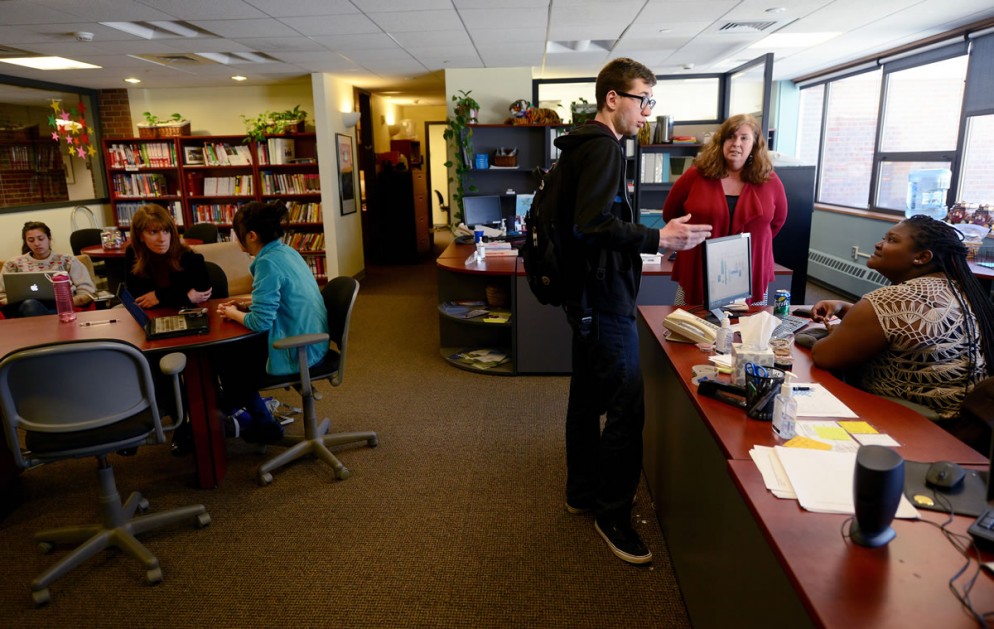It pays to do an internship. (Even an unpaid internship.)
In a recent survey, CC students with job offers prior to graduation were 18 percent more likely to have participated in an internship.
And, according to a 2016 survey by the National Association of Colleges and Employers, 73 percent of employers want colleges and universities to put more emphasis on the ability of students to apply what they have learned in real-world settings with hands-on experiences.
Increasingly, CC students are taking advantage of this way of boosting their experience, skills, and networking connections, according to Megan Nicklaus, director of the CC Career Center.
More than 67 percent of CC students complete at least one internship while they are a student. (Actually the average works out to 1.65 internships per student, based on the Class of 2016 Senior Survey, which has an 86 percent response rate.)
Those numbers are encouraging, says Nicklaus.
“Over the past five years we have continued to see the percentage of students participating in internships climb,” Nicklaus says.
The Career Center provides resources for students on job/internship opportunities, developing their résumés and cover letters, and preparing for interviews, and also helps with guiding students through the process of identifying their strengths, weaknesses,
and interests.
Specifically regarding internships, the Career Center offers a vast array of resources, in-person, group, and online, says Nicklaus.
“We help students explore and identify their interests through navigating the internship search and application process. Students can also attend foundational skill development workshops, learn from alumni and experts in the field through workshops and experts in residence, set up a one-on-one appointment with a Career Center counselor, stop by for a quick question session, participate in Dynamic Half Block, and so much more.”
“We know that networking is the number one way students secure internship opportunities. Students can find current opportunities through both SUCCESS — the Career Center’s online database of jobs, internships, fellowships, and other positions — as well as through the Liberal Arts Career Network (LACN) job/internship boards,” Nicklaus says. “They can keep current on company information sessions, workshops, programs, articles, etc. by visiting our Career Center blog and register to receive emails. And Tiger Link (see story on page 13) is a great opportunity for students to connect with and learn from our incredible alumni community. These are just a few of the many resources available.”
While Nicklaus highly recommends students do an internship or two, that doesn’t mean internships don’t have a few challenges associated with them.
Many internships are unpaid or underpaid, and for students this can pose a real challenge as they try to gain practical work experience. Thanks to generous donations from alumni and parents, the Career Center has a small pot of money that it uses to provide small subsidy grants to students. However, Nicklaus says students still often find themselves in a position where they have to choose whether they can work at an unpaid internship and a part-time job during the summer to be able to pay for current living expenses or expenses they will have when they come back on campus or whether they will have to forgo an internship to work a paid summer job.
“Because many internship opportunities are unpaid, that can make it very difficult for some students to participate,” Nicklaus says. “We welcome alumni referrals for paid internship (and full-time) opportunities and appreciate alumni advocating for paid internships in their workplace and industry.”
But, all in all, the benefits of internships outweigh the challenges. And Nicklaus invites alumni, parents, and friends of the college to help make internships possible for CC students and recent grads.
“There are lots of ways for alumni and others to help. Join Tiger Link and help mentor and coach students about your industry, provide pipelines into your companies, conduct remote mock interviews with students, review résumés, talk to students about the realities of an internship, and connect them to others with whom it might be helpful for the student to speak,” she says. “For some of the students this may be the first time that they have connected for an informational conversation. Students may not always know the best way to ask a question. We would appreciate alumni providing constructive and supportive feedback to students as they continue to learn and grow as professionals.”
Read a Q&A with Abby Stein ’15, former intern at the Colorado Springs Fine Arts Center.

